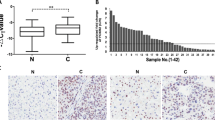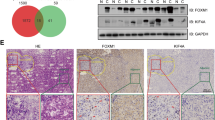Abstract
The forkhead box proteins (FOXO proteins) comprise a large family of functionally diverse transcription factors involved in cellular proliferation, transformation, differentiation and longevity. Recently, ubiquitination and proteasome degradation of FOXO3a have been reported. In this study, we investigated the role of FOXO3a and Skp2 in human hepatocellular carcinoma progression. Immunohistochemical analysis was performed on formalin-fixed paraffin sections of 91 specimens. Furthermore in vitro, western-blot analysis and protein stabilization studies were used to study the relationship between FOXO3a and Skp2. We found that the expression of FOXO3a was negatively related with Skp2 expression (r = −0.583; p < 0.05) and FOXO3a expression correlated significantly with histological grade (p = 0.000), cirrhosis (p = 0.015), and tumor size (p = 0.043) while Skp2 expression correlated significantly with histological grade (p = 0.000) and tumor size (p = 0.005). Kaplan-Meier analysis revealed that survival curves of low versus high expressers of FOXO3a and Skp2 showed a highly significant separation in HCC (p < 0.01). Our results suggested that FOXO3a and Skp2 may be considered to be important prognosis in human hepatocellular carcinoma. In vitro studies suggested that the degradation of FOXO3a may dependent on the expression of Skp2 in the proliferated Huh7 cells.




Similar content being viewed by others
References
Anderson MJ, Viars CS, Czekay S, Cavenee WK, Arden KC (1998) Cloning and characterization of three human forkhead genes that comprise an FKHR-like gene subfamily. Genomics 47:187–199
Aoki M, Jiang H, Vogt PK (2004) Proteasomal degradation of the FoxO1 transcriptional regulator in cells transformed by the P3k and Akt oncoproteins. Proc Natl Acad Sci U S A 101:13613–13617
Borkhardt A, Repp R, Haas OA, Leis T, Harbott J, Kreuder J, Hammermann J et al (1997) Cloning and characterization of AFX, the gene that fuses to MLL in acute leukemias with a t(X;11)(q13;q23). Oncogene 14:195–202
Bosch FX, Ribes J, Borràs J (1999) Epidemiology of primary liver cancer. Semin Liver Dis 19:271–285
Brunet A, Bonni A, Zigmond MJ, Lin MZ, Juo P, Hu LS, Anderson MJ et al (1999) Akt promotes cell survival by phosphorylating and inhibiting a Forkhead transcription factor. Cell 96:857–868
Chakravarthy MV, Abraha TW, Schwartz RJ, Fiorotto ML, Booth FW (2000) Insulin-like growth factor-I extends in vitro replicative life span of skeletal muscle satellite cells by enhancing G1/S cell cycle progression via the activation of phosphatidylinositol 3'-kinase/Akt signaling pathway. J Biol Chem 275:35942–35952
el-Serag HB (2001) vi. Epidemiology of hepatocellular carcinoma. Clin Liver Dis 5:87–107
Galili N, Davis RJ, Fredericks WJ, Mukhopadhyay S, Rauscher FJ 3rd, Emanuel BS, Rovera G et al (1993) Fusion of a fork head domain gene to PAX3 in the solid tumour alveolar rhabdomyosarcoma. Nat Genet 5:230–235
Gilley J, Coffer PJ, Ham J (2003) FOXO transcription factors directly activate bim gene expression and promote apoptosis in sympathetic neurons. J Cell Biol 162:613–622
Greer EL, Brunet A (2005) FOXO transcription factors at the interface between longevity and tumor suppression. Oncogene 24:7410–7425
Hromas R, Costa R (1995) The hepatocyte nuclear factor-3/forkhead transcription regulatory family in development, inflammation, and neoplasia. Crit Rev Oncol Hematol 20:129–140
Hu MC, Lee DF, Xia W, Golfman LS, Ou-Yang F, Yang JY, Zou Y et al (2004) IkappaB kinase promotes tumorigenesis through inhibition of forkhead FOXO3a. Cell 117:225–237
Huang H, Regan KM, Wang F, Wang D, Smith DI, van Deursen JM, Tindall DJ (2005) Skp2 inhibits FOXO1 in tumor suppression through ubiquitin-mediated degradation. Proc Natl Acad Sci U S A 102:1649–1654
Jacobs FM, van der Heide LP, Wijchers PJ, Burbach JP, Hoekman MF, Smidt MP (2003) FoxO6, a novel member of the FoxO class of transcription factors with distinct shuttling dynamics. J Biol Chem 278:35959–35967
Kaufmann E, Knöchel W (1996) Five years on the wings of fork head. Mech Dev 57:3–20
Lai E, Clark KL, Burley SK, Darnell JE Jr (1993) Hepatocyte nuclear factor 3/fork head or "winged helix" proteins: a family of transcription factors of diverse biologic function. Proc Natl Acad Sci U S A 90:10421–104233
Matsuzaki H, Daitoku H, Hatta M, Tanaka K, Fukamizu A (2003) Insulin-induced phosphorylation of FKHR (Foxo1) targets to proteasomal degradation. Proc Natl Acad Sci U S A 100:11285–11290
Medema RH, Kops GJ, Bos JL, Burgering BM (2000) AFX-like Forkhead transcription factors mediate cell-cycle regulation by Ras and PKB through p27kip1. Nature 404:782–787
Modur V, Nagarajan R, Evers BM, Milbrandt J (2002) FOXO proteins regulate tumor necrosis factor-related apoptosis inducing ligand expression. Implications for PTEN mutation in prostate cancer. J Biol Chem. 277:47928–47937
Parkin DM, Bray F, Ferlay J, Pisani P (2001) Estimating the world cancer burden: Globocan 2000. Int J Cancer 94:153–156
Plas DR, Thompson CB (2003) Akt activation promotes degradation of tuberin and FOXO3a via the proteasome. J Biol Chem 278:12361–12366
Potente M, Urbich C, Sasaki K, Hofmann WK, Heeschen C, Aicher A, Kollipara R et al (2005) Involvement of Foxo transcription factors in angiogenesis and postnatal neovascularization. J Clin Invest 115:2382–2392
Ramaswamy S, Nakamura N, Sansal I, Bergeron L, Sellers WR (2002) A novel mechanism of gene regulation and tumor suppression by the transcription factor FKHR. Cancer Cell 2:81–91
Scheffner M, Werness BA, Huibregtse JM, Levine AJ, Howley PM (1990) The E6 oncoprotein encoded by human papillomavirus types 16 and 18 promotes the degradation of p53. Cell 63:1129–1136
Xu X, Yamamoto H, Sakon M, Yasui M, Ngan CY, Fukunaga H, Morita T et al (2003) Overexpression of CDC25A phosphatase is associated with hypergrowth activity and poor prognosis of human hepatocellular carcinomas. Clin Cancer Res 9:1764–1772
Acknowledgments
This work was supported by the National Natural Scientific Foundation of China Grant (No.30300099 and No.30770488), Natural Scientific Foundation of Jiangsu Province Grant (No. BK2003035 and No. BK2006547), College and University Natural Scientific Research Programme of Jiangsu Province (No. 03KJB180109 and No. 04KJB320114), Technology Guidance Plan for Social Development of Jiangsu Province Grant (BS2004526), Health Project of Jiangsu Province (H200632), “Liu-Da-Ren-Cai-Gao-Feng” Financial Assistance of Jiangsu Province Grant (No. 2).
Author information
Authors and Affiliations
Corresponding author
Additional information
Mudan Lu, Jianbo Ma and Wenqun Xue have contributed equally to this work.
Rights and permissions
About this article
Cite this article
Lu, M., Ma, J., Xue, W. et al. The Expression and Prognosis of FOXO3a and Skp2 in Human Hepatocellular Carcinoma. Pathol. Oncol. Res. 15, 679–687 (2009). https://doi.org/10.1007/s12253-009-9171-z
Received:
Accepted:
Published:
Issue Date:
DOI: https://doi.org/10.1007/s12253-009-9171-z




